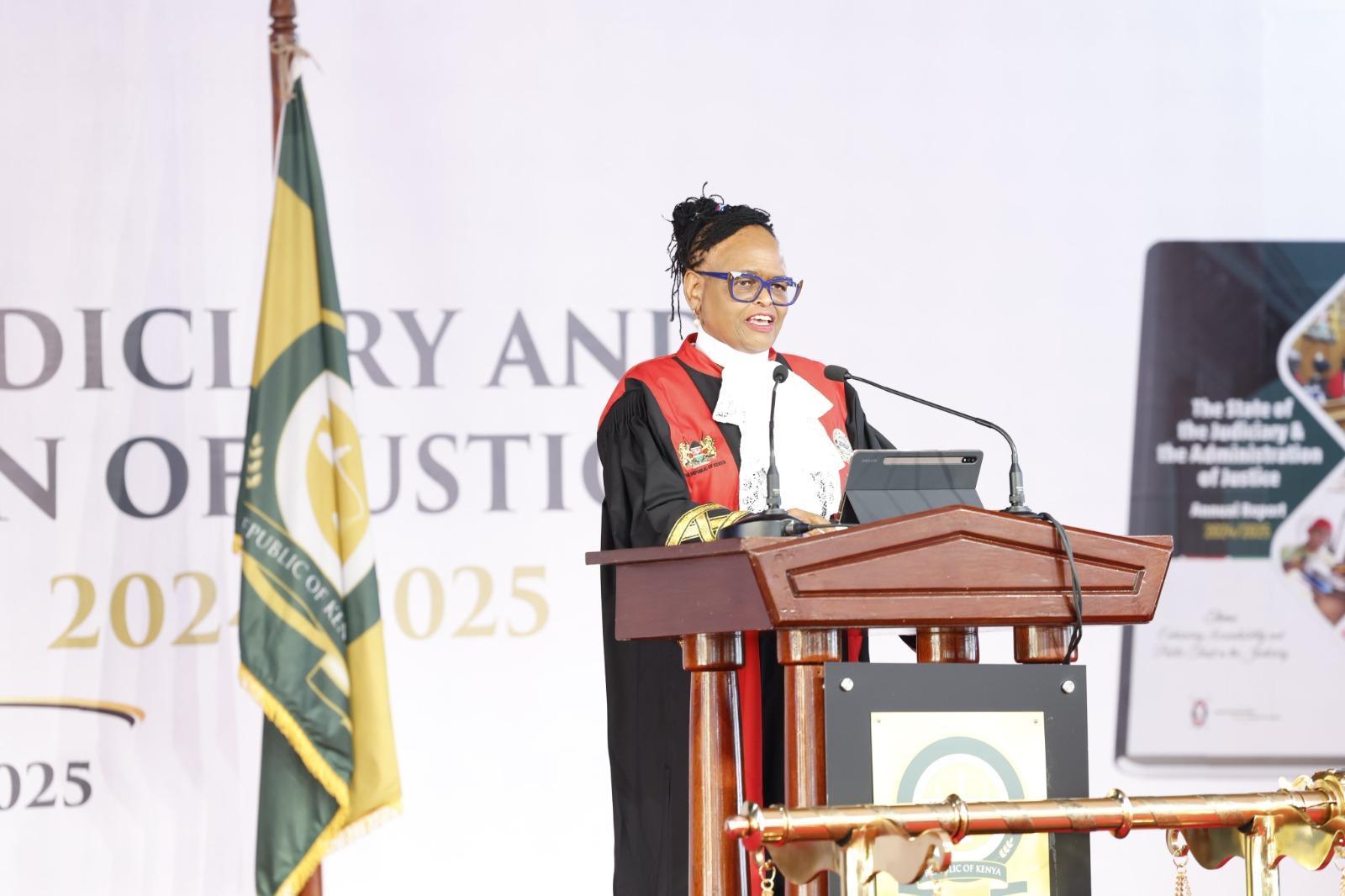Africa-Press – Kenya. The Judiciary has made significant progress in building an accountable, people-centered justice system through reforms aimed at enforcing ethical standards and protecting the public from misconduct, Chief Justice Martha Koome has affirmed.
Speaking while presenting the State of the Judiciary and the Administration of Justice Report (SOJAR) 2024/2025, themed “Enhancing Accountability and Public Trust in the Judiciary,” CJ Koome highlighted the establishment of the Judiciary Spokesperson’s Office, operationalisation of the Judiciary Call Centre, and the inaugural Judiciary Dialogue Day as key steps in strengthening institutional communication.
The event was graced by Deputy President Kithure Kindiki.Deputy President Kithure Kindiki is handed the State of the Judiciary and the Administration of Justice Report (SOJAR) 2024/2025 by CJ Martha Koome, November 21, 2025.
Access to justice has improved significantly through the expansion of the Judiciary’s physical and digital footprint.
“We continued to grow judicial presence across the country by operationalising new courts and sub-registries. These include a new Court of Appeal sub-registry in Garissa, bringing the total number of sub-registries to six; two High Court stations in Isiolo and Makadara; and five additional High Court sub-registries, ensuring the presence of the High Court in all 47 counties,” the CJ said.
The Judiciary also operationalised six new Magistrates’ Courts, bringing the total to 143 in 133 constituencies.
Three new Small Claims Courts were added, increasing the total to 40. A new Appeals Division was established in Nairobi to strengthen the Environment and Land Court’s capacity.
The transition of the Retirement Benefits Appeals Tribunal to the Judiciary raised the number of tribunals under its administration to 27 out of 43 gazetted tribunals.Chief Justice Martha Koome hands the State of the Judiciary and the Administration of Justice Report (SOJAR) 2024/2025 to National Assembly Deputy Speaker Gladys Boss, November 21, 2025.
Shared Services Centres for tribunals were also established in Nairobi and Kisumu to enhance efficiency.
Mobile courts brought services to remote areas, registering 7,872 new cases and resolving 6,751. Court-Annexed Mediation (CAM) expanded to 82 registries, and Alternative Justice Systems (AJS) County Action Plans were implemented in 10 counties by the end of the financial year.
“These alternative pathways reduce adversarial litigation, restore relationships, and reduce pressure on the formal court system,” the CJ observed.
DP Kithure Kindiki delivers his speech during the presentation of the State of the Judiciary and the Administration of Justice Report (SOJAR) 2024/2025.
Efficiency remained a hallmark of operations, culminating in a historic Case Clearance Rate of 104 per cent, with 621,425 cases filed and 647,686 resolved.
“Pending cases reduced by 3 per cent, while backlog, defined as cases older than one year, dropped by 30 per cent, especially at the High Court and Magistrates’ Courts,” CJ Koome revealed.Chief Justice Martha Koome, DP Kithure Kindiki, National Assembly deputy speaker Gladys Boss with the State of the Judiciary and the Administration of Justice Report (SOJAR) 2024/2025, November 21, 2025.
Criminal case filings fell 8 per cent, while civil cases rose 58 per cent, largely driven by Small Claims Court success in expanding access to justice for individuals and small businesses.
Through the Mahakama Popote initiative, 19,089 cases were redistributed from high-volume courts to stations with lower caseloads, resolving 14,240 matters and demonstrating the impact of digital innovation in case management.DP Kithure Kindiki with CJ Martha Koome and Deputy CJ Philomena Mwilu at Judiciary
Digitisation has been a central pillar, with accelerated automation through the Case Tracking System, AI-enabled speech-to-text transcription, and enhanced infrastructure covering 177 court stations.
The Judiciary Mobile App allows litigants to track cases, access updates, and obtain real-time information.
Chief Registrar Winfridah Mokaya described SOJAR as an accountability instrument for public resources and a strategic tool for assessing the socio-economic impact of Judiciary programmes.
Evelyn Olwande of the Judicial Service Commission noted the report also serves as a mirror reflecting performance and transformation, guiding future priorities.
Alongside SOJAR, the Judiciary unveiled the STAJ Blueprint Simple Guide, distilling the core ideas, vision, and priorities of the Social Transformation through Access to Justice Blueprint into an accessible format for the public.
For More News And Analysis About Kenya Follow Africa-Press






